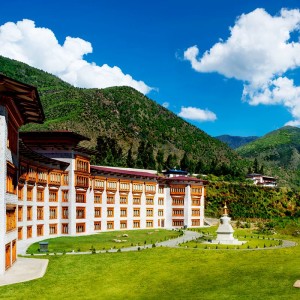BHUTAN GOVERNMENT TRYING TO OFFER MORE INCENTIVES FOR TOURISM INDUSTRY
Tax holiday in the offing for the hospitality sector
Newly established high-end resorts and tourist standard hotels will enjoy a 10-year income tax holiday from the date of commencing commercial operations should the draft Economic Development Policy (EDP) materialize.
However, the tourist standard hotels and resorts should be established between January 1, 2016 and December 31, 2019.
Import of furniture and fixtures, kitchen and laundry equipment, mattresses and linens, cutlery and crockery (with embossed logo of the hotel concerned), sanitary wares and electrical fittings shall be exempted from customs duty and sales tax on recommendation of the Tourism Council of Bhutan (TCB).
This, according to the draft EDP is because quality of tourist class hotels is of paramount importance besides facilitating such investments.
Currently, tourist standard hotels and resorts established from 2010 to 2015 also enjoy the same tax benefits.
TCB classifies and categorizes tourist standard hotels and resorts based on 320 parameters under six broad features of location and type of property; room comfort, quality of equipment, fittings and furniture; service facilities; leisure facilities; additional in house facilities and services; and sustainable tourism practices.
The draft EDP also states that farmhouses that meet the minimum standards for hospitality shall register with TCB and be exempt from all licensing requirements and income tax.
Similarly, a 10-year tax holiday shall be provided to guest traditional village houses and lodges that meet the minimum standards for hospitality established between January 1, 2016 and December 31, 2019.
Existing hotels are also eligible for a reinvestment allowance of 25 percent of the total capital expenditure incurred for up-gradation should the draft EDP gets the green signal from the government.
Economic affairs minister Norbu Wangchuk in an earlier interview said, “the document is still in a draft stage and would require a lot of discussions before it becomes a policy.”
There are about 133 hotels across the country with the highest located in Thimphu, Paro and Punakha. The occupancy rate is about 30 to 35 percent on an average for hotels in the western region, about 17 percent in central and seven percent in the eastern region.
With most of the hotels located in the western region, some hoteliers said that the incentives should be prioritized based on the dzongkhags.
Hoteliers said that as the hospitality sector makes the highest investment, such incentives are necessary. However, some said it was time the government shift the focus to other dzongkhags.
One of the hoteliers said that the tax holiday and exemptions helped the hospitality sector grow with more competition that also saw improvement in standards.
“It’s time the agencies concerned study the carrying capacity to project the required rooms,” one hotelier in Paro said. “This would also help equal spread of regional benefits.”
Seasonality is a prominent issue that hoteliers in the country face today.
As is the trend, the annual tourism report 2014 states that Paro, Thimphu and Punakha recorded the highest number of bed nights in 2014. Bed nights in Paro constituted about one-third (34.43 percent) of the total followed by Thimphu and Punakha that composed 26 percent and 16 percent of the total bed nights respectively.
Source: Kuensel (Kinga Dema)

